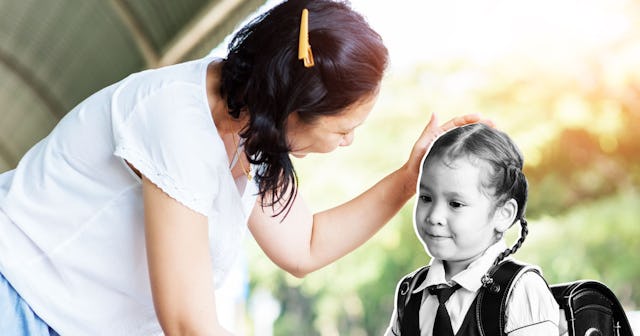Your Young Child Is Incapable Of Sincere Gratitude, And That's Okay

Like many immigrants searching for the American dream, my father longed to give his family a better life than he had. Born in Greece in the late 1920s, he experienced poverty, hunger, and war before arriving in the United States. Yet, when he finally achieved the American dream, he was ironically frustrated with his family because we hadn’t seen the things he had and therefore we were spoiled and ungrateful.
Throughout my childhood, my father was fixated on getting sincere gratitude out of his children. Similar to millions of parents, he’d worked hard, yet he felt his family didn’t know and didn’t care about his sacrifices. My father demanded customized appreciation on a frequent schedule, spiking around major holidays, his birthday, and when bills were due.
When I see parents today hand wringing over ungrateful children, I long to explain all the reasons why that demand is unrealistic.
One person cannot force another to experience emotions. Similar to love, hope, or anger, gratitude is a complex, deep-rooted feeling that can only come from within as a response to external factors. Insisting a child feel a specific way sends a terrible message: we can insist that others feel as we desire rather than what is genuine. What is a parent supposed to do when his child doesn’t feel satisfactory appreciation on cue? Unfortunately, a very common response from a child is a dishonest one, which doesn’t bode well for the child or the parent.
Providing children with food, shelter, health care, etc. is the most basic requirement of a parent. Asking a child to be thankful for what a parent is already supposed to do is disparaging to everyone. I changed my son’s diapers and bathed him because I chose to do so. I wouldn’t expect him to thank me, nor would I want him to. Gratitude insults and simplifies my role in his life, as I do not serve my child.
amriphoto/Getty
For a bulk of their lives, children do not make a lot of big choices of their own, rightfully so. We parents decide where our kids live, where they go to school, what clothes they can wear, what kind of food they eat and when, which extended family members they get to see, etc. How can one be truly grateful for a short life that is largely dictated by others?
Children do not have a solid grasp or deep emotional understanding of the world simply because they are not intellectually equipped to do so and they’ve not lived away from home. Therefore they only know the world they currently live in and whatever else their parents and teachers expose them to. To be truly grateful, one must acknowledge that all the positive elements of life can disappear at any minute. Young children are incapable of that acknowledgement.
My high school had over 1200 students in three grades but fewer than ten black students. I was 21 years old before I met a Jewish person for the first time. My parents sincerely believed (and still do) that the world was a dangerous place for women and girls who travel so the only safe place was my predominantly white hometown. Even within that rigid boundary, my parents regarded my friends’ familial differences and traditions with suspicion instead of curiosity. As a result, I was never substantively exposed to diversity and other ways of life until long after I left home. For example, I never grasped the passion of protesting until I was in Baltimore during the riots for Freddie Gray.
To be sure, no parent wants to raise entitled, demanding children with no empathy for others. The combination of this fear and unrealistic parenting expectations is certainly what drives the need for recognition from our kids. Although my father went to great pains to ensure my sister and I were not spoiled, he failed to complement his intense efforts by laying the foundation for well-rounded and grateful daughters. We couldn’t be sincerely grateful as children for the only home we’d ever known without seeing firsthand different lives, cultures, and nationalities.
The best things well-meaning parents can do for their children are drop all expectations and requirements for gratitude and start initiating activities and fostering conversations that will increase the chances of heartfelt appreciation and empathy later in life. As we are often told, parenting comes with no guarantees, and that includes hearing a “thank you.”